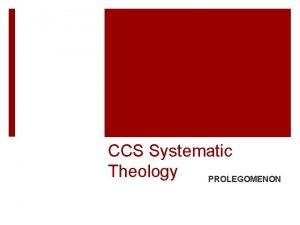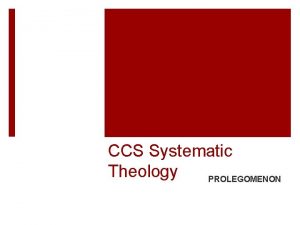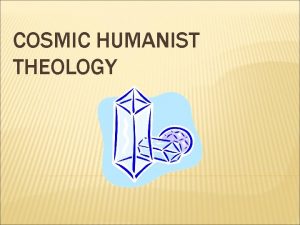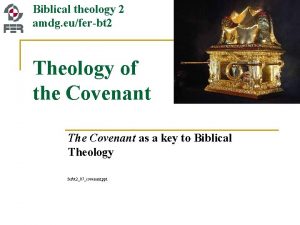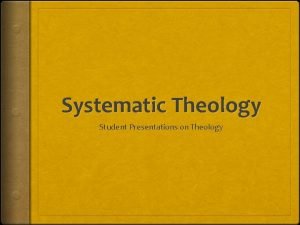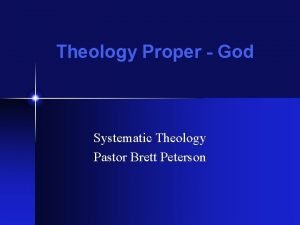Theology What is Theology Theology is the study










































- Slides: 42

Theology

What is Theology? Theology is the study of God—who He is, what he does, and how humans can know him. The world theology comes from two Greek words: theos (God) logos (word/study/doctrine)

What is theology? “A unified science in which all things are treated under the aspect of God either because they are God himself or because they refer to God. ” Thomas Aquinas (1225 – 1274) Summa Theologica 1. 1. 7

What is Theology? Is “theology” only for Christians? Do other religions and groups have theology?

What is Theology? Yes, there are other groups that do theology—they study about their deity(ies) or supernatural power

Alterative Terms Hierology has been proposed as a term that may be used to study higher powers, deities, or supernatural forces in other religions and traditions. Hierology means the study of holy or sacred things. Some prefer the term “philosophy” such as Buddhist philosophy.

Why study Theology? Why do people study theology? • To understand their own religion and deity more • To understand another religion more • To compare religious traditions and beliefs • To defend a certain religious tradition • To change or reform a certain religion • To help propagate a religion • To help with a present need or conflict • To make sense of the world and current events • To explore and understand the concept of “deity” • To challenge a certain religious tradition

Chapter 1 In chapter one, we will examine what the six worldviews in our textbooks have to say about the subject of theology. Thomas Aquinas, Christian Theologian Dietrich Bonheoffer, Christian Theologian Allamah Sayyid Abul A'la Maududi , Islamic Theologian Theological Students , Hindu Seminary

Theology through the Christian Lens

Theism The Christian worldview is a theistic one—Christians believe in the existence of a supernatural God. Christians have identified Him as YHWH, the one revealed primarily in the Old Testament Hebrew Scriptures and the New Testament Greek Scriptures. There are two ways that Christians have come to the conclusion that there is a God:

1. General Revelation is what it is titled—a general (non-specific) communication from God to mankind in all times and in all places. • The beauty and majesty of creation • A certain order to the universe

A Hypothetical Question You look at the earth. It’s magnificent. There seems to be a generalized order and design to it. You realize that someone or something created this world. That’s all you know. What else would you want to know about this god/deity/force/supernatural power? You may want to know if it male or female? What is this god like? What is his or her personality? How powerful is this god? What are some other questions we could ask about this “god? ”

1. General Revelation Is General Revelation sufficient? “General revelation has been viewed consistently througout church history by a variety of Christian theists as a necessary but insufficient means for providing knowledge abut the Creator and His character. ” p. 44 General Revelation points us in the right direction, but it doesn’t get us to our destination.

2. Special Revelation tells us the specific information we need to know to have an understanding of who God is and what He does. What ways has God given special revelation to humans?

A. The Bible is God’s special revelation to humans. The Bible, first, was created by divine inspiration. All scripture is God-breathed, meaning that God gave his power and authority to the words of the Bible. It also means that even one word or letter was not written without his approval. This book claims to have a special certification from God to be accurate and to contain absolute truth.

A. The Bible is a written record of God’s creation, interaction with mankind (especially Israel), and His spoken words. What can we learn about God from reading the Bible?

B. The Person of Jesus Christ God becomes a man—Jesus Christ. Jesus was fully divine(God) and fully human. He walked among humanity—teaching, preaching, serving, loving. We did not go God, but God came down to us.

Some Thoughts “Special revelation, then, is the linchpin of Christianity, while general revelation serves as a prod that encourages us to recognize the ultimate truths set down in Scripture and embodied in Jesus Christ. ” p. 45 Special Revelation= gives us the information we need to be saved General Revelation= pushes us in the right direction

Intelligent Design General Revelation causes us to believe in a higher power because of the majesty and glory of creation. Such complexity seems to convey design or purpose. If something appears to be designed, then it must have a designer.

Complexity General Revelation causes us to believe in a higher power because of the majesty and glory of creation. Such complexity seems to convey design or purpose. If something appears to be designed, then it must have a designer.

Apologetic Arguments

The Cosmological Argument Cosmos= means universe in Greek (this word is used in English too) An argument that basically says that every thing we know in the universe has a cause. Something made it happen or created it. If there is a cause, there must be a causer Sometimes called “The unmoved mover”

The Teleological Argument Teleos= means end, purpose, or goal in Greek (It’s similar to the cosmological argument) If the universe has order and harmony that looks like a design was in place. Having a design denotes purpose and reason.

The Moral Argument Humans seem to have a sense of right and wrong. They also seem to have a sense that justice must be given to those who commit wrong. Where does that come from? If no deity or God put the standard of right and wrong into place, how can we decide what truly is right or wrong?

Let’s be nice…

The Truth in Love The truth is a It is powerful. It will cut.

The Truth in Love The truth without love will cut the heart

The Truth in Love Too much “love” with no truth will accomplish little.

What is the value of this?

Evangelism When we share our faith, we are speaking to a person. A person is a complex being– an emotional, physical, spiritual, intellectual, social being. Many people have “strongholds” built up in these areas which block them from knowing God.

2 Corinthians 10: 3 -5 For though we live in the world, we do not wage war as the world does. The weapons we fight with are not the weapons of the world. On the contrary, they have divine power to demolish strongholds. We demolish arguments and every pretension that sets itself up against the knowledge of God, and we take captive every thought to make it obedient to Christ.

Strongholds ὀχύρωμα, n {okh-oo'-ro-mah} 1) a castle, stronghold, fortress, fastness 2) anything on which one relies 2 a) of the arguments and reasoning by which a disputant endeavors to fortify his opinion and defend it against his opponent

The Trinity Believing in the “trinity” Trinitarianism) is a fundamental belief in the Christian faith. Although the word “trinity” is not found in the Bible, we believe that it explains the personhood of God faithfully according to the Bible. Trinitarian Theism: The belief in one God who exists as three separate persons—Father, Son, and Holy Spirit.

Side Note: Deism Word Origin: Latin 1. belief in the existence of a God on the evidence of reason and nature only, with rejection of supernatural revelation (distinguished from theism). 2. belief in a God who created the world but has since remained indifferent to it. definition: dictionary. com

Theism and Deism Theism is the belief in a personal and supernatural deity who created the world and interacts with humankind and creation. (General and Special Revelation) Deism is the belief in a god or higher power based on only the general revelation given to humankind. This God does not interact with humans and creation. (Only General Revelation)

Who is YHWH? What do Christians believe about YHWH? Sovereign- His will is always done (permissive at times) Moral- Goodness and character Patient- Delays judgment Faithful- Keeps promises Powerful- Creation, intervention Creative- Variety and wonder of creation Loving- Loves those who do not love him What else would you say?

God as Judge The “God of love” is also the “God of wrath. ” The holiness of God necessitates the judgment of God. Christianity teaches that God is fair and always right, because His nature is perfect. God is not a bully. He wants humanity to get it right. Unfortunately, they don’t so his judgment must stand. The Bible is clear in communicating that God does not take pleasure in the judgment of the wicked (Ezekiel 33: 11), but the wicked must be judged because God is holy (Jude 15)

God as Redeemer What can save us on Judgment Day? God is a redeemer; he saves humanity from his judgment and wrath. “The central theme of redemption is the love of God. ” p. 48 Let’s talk about God’s love…

God’s love is universal God loves every national, tribe, race, class, and gender equally. God died for all types of people—no social prejudices. rich and poor free and the slave old and the young man and woman healthy and sick

God’s love is gracious “But God demonstrates His own love towards us, in that while we were yet sinners, Christ died for us. ” Romans 5: 8 God demonstrates incredible graciousness when dealing with humanity. His love and mercy are so awesome that He can love the sinner while hating the sin.

God’s love is sacrifical Jesus was not sent just to be a teacher or good man. He came as the perfect sacrifice for humanity’s sin. The sacrifices of the Old Testament were temporary and unfulfilling, but Jesus’ sacrifice on the cross was complete and once and for all. “Through the death of Christ, God has reconciled the world to Himself, and offered a way for His wrath to be appeased—humanity now must be reconciled to God through faith in Christ. ” p. 49

God’s love is beneficial God’s love changes us. It benefits us. No condemnation (Romans 3: 24) Not captive to sin (Romans 6: 11) A New Creation (2 Corinthians 5: 17) Declared Righteous (2 Corinthians 5: 21) Redeemed (1 Peter 1: 18) Forgiven (Ephesians 1: 7) Given eternal life (John 3: 16)
 Book of haggai
Book of haggai Thế nào là mạng điện lắp đặt kiểu nổi
Thế nào là mạng điện lắp đặt kiểu nổi Mật thư tọa độ 5x5
Mật thư tọa độ 5x5 Lời thề hippocrates
Lời thề hippocrates Vẽ hình chiếu đứng bằng cạnh của vật thể
Vẽ hình chiếu đứng bằng cạnh của vật thể Glasgow thang điểm
Glasgow thang điểm Quá trình desamine hóa có thể tạo ra
Quá trình desamine hóa có thể tạo ra Khi nào hổ con có thể sống độc lập
Khi nào hổ con có thể sống độc lập điện thế nghỉ
điện thế nghỉ Các châu lục và đại dương trên thế giới
Các châu lục và đại dương trên thế giới Dạng đột biến một nhiễm là
Dạng đột biến một nhiễm là Nguyên nhân của sự mỏi cơ sinh 8
Nguyên nhân của sự mỏi cơ sinh 8 Bổ thể
Bổ thể Phản ứng thế ankan
Phản ứng thế ankan Làm thế nào để 102-1=99
Làm thế nào để 102-1=99 Thiếu nhi thế giới liên hoan
Thiếu nhi thế giới liên hoan Phối cảnh
Phối cảnh Hát lên người ơi
Hát lên người ơi Một số thể thơ truyền thống
Một số thể thơ truyền thống Hệ hô hấp
Hệ hô hấp Công thức tính độ biến thiên đông lượng
Công thức tính độ biến thiên đông lượng Số.nguyên tố
Số.nguyên tố Tỉ lệ cơ thể trẻ em
Tỉ lệ cơ thể trẻ em đặc điểm cơ thể của người tối cổ
đặc điểm cơ thể của người tối cổ Các châu lục và đại dương trên thế giới
Các châu lục và đại dương trên thế giới ưu thế lai là gì
ưu thế lai là gì Thẻ vin
Thẻ vin Các môn thể thao bắt đầu bằng tiếng bóng
Các môn thể thao bắt đầu bằng tiếng bóng Tư thế ngồi viết
Tư thế ngồi viết Cái miệng nó xinh thế chỉ nói điều hay thôi
Cái miệng nó xinh thế chỉ nói điều hay thôi Hình ảnh bộ gõ cơ thể búng tay
Hình ảnh bộ gõ cơ thể búng tay Từ ngữ thể hiện lòng nhân hậu
Từ ngữ thể hiện lòng nhân hậu Trời xanh đây là của chúng ta thể thơ
Trời xanh đây là của chúng ta thể thơ Tư thế ngồi viết
Tư thế ngồi viết Chó sói
Chó sói Ví dụ về giọng cùng tên
Ví dụ về giọng cùng tên Thể thơ truyền thống
Thể thơ truyền thống Hổ đẻ mỗi lứa mấy con
Hổ đẻ mỗi lứa mấy con đại từ thay thế
đại từ thay thế Thế nào là hệ số cao nhất
Thế nào là hệ số cao nhất Diễn thế sinh thái là
Diễn thế sinh thái là Vẽ hình chiếu vuông góc của vật thể sau
Vẽ hình chiếu vuông góc của vật thể sau Slidetodoc
Slidetodoc












































